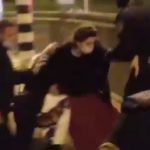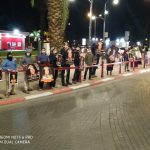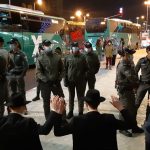Honenu is representing those who are insisting on the investigation of the death of Ahuvia Sandak z”l who was tragically killed in a police car chase and defending the many who are being detained while demonstrating for change in police behavior. The car Ahuvia was in with four other boys overturned when the police car collided with it from behind. Please click here for a list of posts connected to the case.
Sunday, July 11, 2021, 16:22 Honenu has filed more than 28 complaints – civil suits, complaints to the Police Investigation Unit, and complaints to the Public Complaints Officer – on behalf of protesters over police conduct at demonstrations protesting the death of Ahuvia Sandak, z”l, in a car chase with the Binyamin Police on December 21, 2020. The amount of compensation requested ranges from 20,000 to 50,000 NIS. Demonstrations protesting the Israeli Police in general and the Central Unit of Yehuda and Shomron Police in specific took place throughout Israel for approximately four months after Ahuvia’s death. Many of the thousands of demonstrators requested legal counsel from Honenu regarding false detentions, police brutality, unjustified fines, strip searches, and other means that the police used to deprive them of their legal right to protest.
Honenu’s Eladi Weisel, who filed the complaints, stressed that the protests, which took place during the third coronavirus wave, were in accordance with the law. Although the protests were held in open areas and at major intersections, there were many instances of demonstrators being denied their right to protest on the pretext that they were violating coronavirus regulations. Many of the detainees were fined for coronavirus regulations violations, despite the legality of the protests.
Additionally, there was no legal purpose for many of the detentions at the protests. Most of the detainees were not interrogated, but rather left overnight in the police station without any police procedure having been done that would justify their remand. In the morning they were released without anything other than a fine for a coronavirus violation, which itself was illegal in light of the permission to protest set in the coronavirus regulations. Honenu is of the opinion that the detentions served as means to deter and disperse protests, which is illegal.
One of the suits, filed for 25,000 NIS, pertains to the detention of a youth who crossed a street on a crosswalk at a green light as a protest was being held nearby at the String Bridge in Jerusalem. Policemen detained him on the crosswalk and loaded him into a police car. When the startled youth asked why he was being detained, the policemen replied that he was disturbing public order. He was taken to the police station and released approximately nine hours later, at seven in the morning.
In another case, a 14-year-old girl was detained and underwent an invasive search at the police station. She was not interrogated and no police procedure was carried out. She was held overnight and released in the morning, without coordinating her return home with her parents.
Honenu’s Eladi Weisel, who filed the complaints and the suits, leveled sharp criticism at the police: “The Israeli Police displayed outrageous and scandalous conduct by systematically falsely detaining protesters without any cause or purpose. These detentions only start to reveal the flawed use by the Israeli Police of detentions as a deterrent to curb protests not to their liking. By law, detentions are intended for investigative purposes, not deterrence. The Israeli Police acted brutally and illegally in an attempt to suppress legitimate protest against them. We hope that thanks to the actions we took, the freedom to protest will be maintained even when it is the police who are being protested.”



